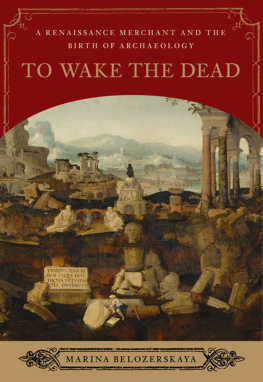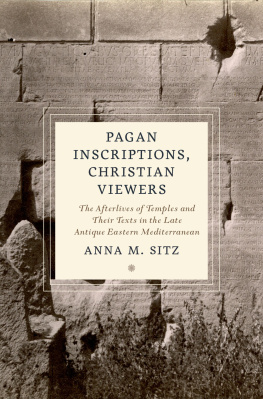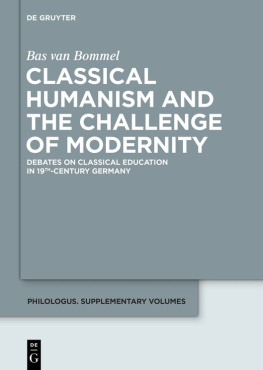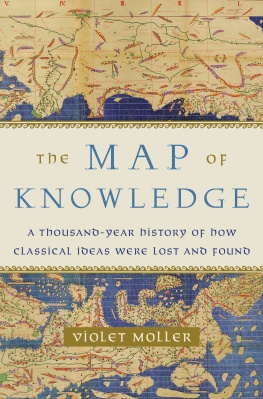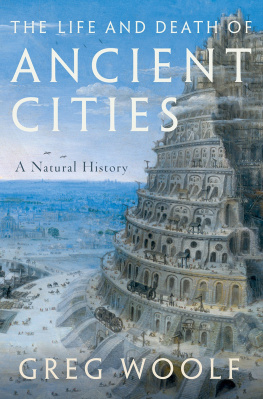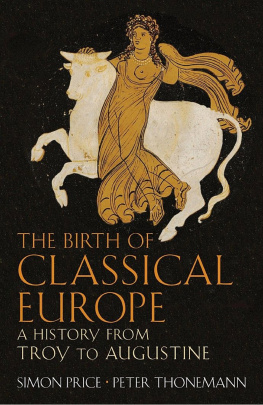Presumed portrait of Cyriacus. Ancona, City Museum. (Kenneth Lapatin)
TO WAKE THE DEAD
A Renaissance Merchant and the Birth of Archaeology
MARINA BELOZERSKAYA

W. W. NORTON & COMPANY
NEW YORK LONDON
Copyright 2009 by Marina Belozerskaya
All rights reserved
Francesco Scalamonti. Vita Viri Clarissimi et Famosissimi Kyriaci Anconitani . Charles Mitchell and Edward W. Bodnar, eds. and trans. Transactions of the American Philosophical Society, volume 86, part 4. Philadelphia: The American Philosophical Society, 1996.
Reprinted by permission of the publisher from Cyriac of Ancona: Later Travels , edited and translated by Edward W. Bodnar, The I Tatti Renaissance Library, Cambridge, Mass.: Harvard University Press, Copyright 2003 by the President and Fellows of Harvard College.
For information about permission to reproduce selections from this book, write to Permissions, W. W. Norton & Company, Inc., 500 Fifth Avenue, New York, NY 10110
Library of Congress Cataloging-in-Publication Data
Belozerskaya, Marina, 1966
To wake the dead: a Renaissance merchant and the birth of archaeology /
Marina Belozerskaya.1st ed.
p. cm.
Includes bibliographical references and index.
ISBN: 978-0-393-07284-6
1. Ciriaco, dAncona, 13911452. 2. ArchaeologyHistory. 3. ItalyIntellectual
life12681559. 4. ArchaeologistsItalyBiography. 5. ClassicistsItaly
Biography. 6. TravelersMediterranean RegionBiography. I. Title.
CC115.C57B456 2009
930.1dc22
2009016582
W. W. Norton & Company, Inc.
500 Fifth Avenue, New York, N.Y. 10110
www.wwnorton.com
W. W. Norton & Company Ltd.
Castle House, 75/76 Wells Street, London W1T 3QT
For Ken, companion of my travels
CONTENTS
favor the enterprise, having already filled the sail
of your servant, the blithe one from Ancona,
who unveils the noble ancient world to the new
Cyriacus of Ancona
February 1, 1446
TO WAKE THE DEAD

Arch of Trajan in Ancona. (Kenneth Lapatin)
It is possible that some word of me may have come to you, though even this is doubtful, since an insignificant and obscure name will scarcely penetrate far in either time or space. If, however, you should have heard of me, you may desire to know what manner of man I was, or what was the outcome of my labors, especially those of which some description or, at any rate, the bare titles may have reached you.
Petrarch, Letter to Posterity
On the Threshold of History
I N THE AUTUMN OF 1421 something remarkable happened in Ancona, a port city on the Adriatic coast of Italy south of Venice.
A thirty-year-old clerk named Cyriacus Pizzecolli, responsible for helping to reform the ports disordered bookkeeping system at the behest of the new governor, was hurrying to work along the waterfront. He passed carracks swaying in the dirty water and creaking wooden cranes swinging between the quay and the ships, their loads dangling in the air. He exchanged greetings with merchants inspecting newly arrived shipments of spices, slaves, cotton, and wax from eastern markets, and scuttled out of the way of porters groaning under the sacks of nuts, jars of Apulian olive oil, bales of Florentine, Lombard, Flemish, and Catalan cloth, local soap, and Balkan lead they were loading on outgoing boats. As he scanned the inventory of goods passing through the port, he overheard brokers haggling with handlers, sailors singing and swearing as they scrubbed decks and adjusted rigging, boys laughing as they ducked in and out of crowds in search of adventure and mischief, and seagulls flying overhead.
Slight and wiry, Cyriacus was restless by nature, his small eyes ever scanning the scene for something interesting, his large aquiline nose seemingly pulling him forward, his pointy chin and dimpled cheeks hinting at coiled energy that could erupt at any moment into a charming chatter or a decisive dash toward some aim. But the real motor within him was his hungry mind. Cyriacus was bored by his job of streamlining financial regulations and procedures, and unfulfilled by his daily reality of money and merchandise. He yearned for something bigger, a more meaningful life. Occasionally, in awkward poems he composed at night, he poured out his frustrations:
Not to follow the style which urges us to lofty
Parnassus
do I shed the ink of my ampoules,
but to follow my commercial labor;
I write and cancel out, and in my books
the debtor is nurtured instead of poetry.
Alas, his fathers premature death when Cyriacus was just a boy had left him little choice beyond earning a living through plain accountancy and trade.
As Cyriacus hastened along the quay, something caught his eye and caused him to look up at the Roman arch that rose over the port. He had passed it countless times since childhood. It had always been there, and while he had noticed with interest ancient buildings on his trips to Alexandria and Constantinople, he had paid little attention to this structure at home, its very familiarity making it blend into its surroundings. Yet nowdid the light fall on the arch in a particular way, throwing into sharper relief traces of letters incised into the marble?he seemed to see it for the first time. He slowed down, came closer, and peered at it with curiosity.
The gleaming white monument was astonishingly well preserved, considering it had been erected centuries ago. Its inlaid bronze letters had been pried out, leaving the inscriptions as ghostly cavities, but the rest of the structure was intact and appeared light and graceful. Two pairs of elegantly fluted columns flanked the portal. The upper story was articulated with a series of horizontal lines, still crisp, as if only recently carved. Cyriacus was struck by the beauty of the arch, all the more so compared to the coarse warehouses and port cranes around it. And it seemed to be speaking to him.
Like someone suddenly lovestruck, Cyriacus began admiringly to study the arch, examine it from every angle, puzzle out why it attracted him so suddenly and intensely. He could not read Latin, but managed to make out the name of the emperor Trajan and surmised that he was responsible for the structure. What had life in Ancona been like in Trajans reign, over a millennium before? Had the place been a prosperous port or a small town, had it been handsome or humble? It must have possessed wealth and sophistication enough to erect such an elegant and enduring monument. As Cyriacus pondered the arch and the distant time to which it belonged, it dawned on him that what the arch was whispering to him was an invitation to uncover that long-ago history and bring it back from oblivion.
Cyriacuss contemporarieslike him, up to that momentwere largely indifferent to the scattered vestiges of the bygone civilizations amidst which they passed their lives. Of course, ancient textsVirgil, Ovid, Cicero, Livy, and books by several other authorswere still read by boys in Latin schools and cherished by intellectuals. And many cities claimed Romans, Etruscans, and even Trojans as their founders. Some antique monuments had been given a Christian use or interpretation and were thus treated with veneration. In the course of the Middle Ages nearly all the bronze sculptures of gods, rulers, and athletes that once populated ancient cities and sanctuaries had been melted down for weapons and coins. But the equestrian statue of Marcus Aurelius escaped this fate and was given a place of honor in front of the church of St. John Lateran in Rome because it was thought to depict Constantine the Great, the emperor who recognized Christianity as an official religion. Countless ancient buildings, meanwhile, had been more or less haphazardly incorporated into churches, fortresses, and houses constructed into or around them. Cyriacus had seen such hybrids during his business trips around Italy and abroad. It was much cheaper and easier to add on to well-constructed old cores than to demolish them and start anew.

